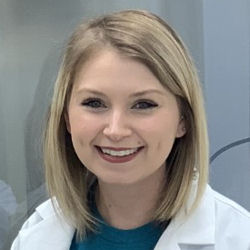
Amanda L. Collar
— MEDICAL SCHOOL —
University of New Mexico School of Medicine
— GRADUATING CLASS —
2024
I pass a group of people protesting downtown, without a mask in sight. They wave their American flags and hold signs declaring their freedom and liberty. But, I go to work.
As I walk to my car, I pass by a busy bar with groups of friends inside. I can see their laughter because they have abandoned their masks, which sit on the table beside them. But, I go to work.
I see Instagram posts from acquaintances on vacation and attending maskless weddings. I scroll through Facebook and see misinformation about COVID-19 and vaccine safety. I feel a wave of disappointment and defeat. But, I go to work.
I spend eight hours in my laboratory or occasionally in the clinic, the sites of my training to complete an MD–PhD—my “day job.” I'm exhausted from a busy day. But, I still go to work.
I go to work at a second job that I had no intention of taking up, where I test patient samples for SARS-CoV-2. As I rush into the building, I pass nine looming refrigerated trucks: the morgue trucks containing the spillover from having too many patients pass away. This serves as a vivid and grim reminder as to just how high the stakes are.
My evenings are spent with patient samples, putting each into a small well of a plate containing 96 individual wells. The plate reminds me of stained glass—I create an abstract work of art in each plate, adding samples that are light peach, pale pink, bright fuchsia, dark red, and sometimes even purple or green to the wells.
At the beginning of the shift, you are acutely aware that this plate represents real people awaiting their results, a possibly life-altering moment. Having taken a COVID-19 test after an exposure, I can relate all too well to the flood of emotions: anxiety, worry, fear.
However, after the second plate of the night, your mind starts to wander as muscle memory takes over. “I need to do the dishes when I get home” and “Remember to send that email.” By the fifth plate of the night, your back starts to ache, begging to move and stand up straight. Your shoulder aches from the repetitive motion of adding sample after sample.
Yet, there I am, with my hands deep in the biosafety cabinet.
By 10 p.m., I'm desperate to go home and sleep after working a 13-hour day between both jobs. I walk to my car, passing the ominous refrigerated trucks again. This time, the door is open and I see in—white body bag after white body bag. An image of death I'll never forget.
I think back to the beginning of the pandemic, a year ago this month. I would never have guessed that it would stretch out this far and would get so bad, with so many lives needlessly lost.
I walk into my apartment building still thinking about the refrigerated trucks, the white body bags, and the grief they represent. I pass by a neighbor's door, where sounds of music and laughing spill into the hallway: signs of an unsafe gathering.
But, tomorrow I'll go back to work.
Back to the May 2021 issue of ACP IMpact

